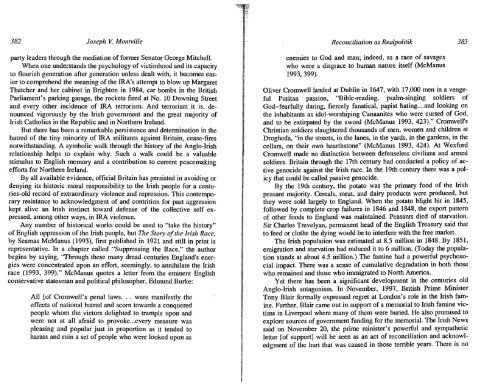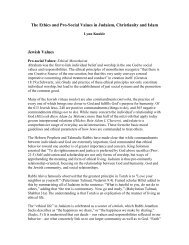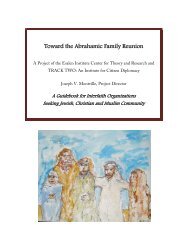Reconciliation as Realpolitik - Abrahamic Family Reunion
Reconciliation as Realpolitik - Abrahamic Family Reunion
Reconciliation as Realpolitik - Abrahamic Family Reunion
Create successful ePaper yourself
Turn your PDF publications into a flip-book with our unique Google optimized e-Paper software.
382 Joseph V. Montville<br />
<strong>Reconciliation</strong> <strong>as</strong> <strong>Realpolitik</strong><br />
383<br />
party leaders through the mediation of former Senator George Mitchell.<br />
When one understands the psychology of victimhood and its capacity<br />
to flourish generation after generation unless dealt with, it becomes e<strong>as</strong>ier<br />
to comprehend the meaning of the IRA's attempt to blow up Margaret<br />
Thatcher and her cabinet in Brighton in 1984, car bombs in the British<br />
Parliament's parking garage, the rockets fired at No. 10 Downing Street<br />
and every other incidence of IRA terrorism. And terrorism it is, denounced<br />
vigorously by the Irish government and the great majority of<br />
Irish Catholics in the Republic and in Northern Ireland.<br />
But there h<strong>as</strong> been a remarkable persistence and determination in the<br />
hatred of the tiny minority of IRA militants against Britain, ce<strong>as</strong>e-fires<br />
notwithstanding. A symboHc walk through the history of the Anglo-Irish<br />
relationship helps to explain why. Such a walk could be a valuable<br />
stimulus to English memory and a contribution to current peacemaking<br />
efforts for Northern Ireland.<br />
By all available evidence, official Britain h<strong>as</strong> persisted in avoiding or<br />
denying its historic moral responsibility to the Irish people for a centuries-old<br />
record of extraordinary violence and repression. This contemporary<br />
resistance to acknowledgment of and contrition for p<strong>as</strong>t aggression<br />
kept alive an Irish instinct toward defense of the collective self expressed,<br />
among other ways, in IRA violence.<br />
Any number of historical works could be used to "take the history"<br />
of English oppression of the Irish people, but The Story ofthe Irish Race,<br />
by Seam<strong>as</strong> McManus (1993), first published in 1921 and still in print is<br />
representative. In a chapter called "Suppressing the Race," the author<br />
begins by saying, "Through these many dread centuries England's energies<br />
were concentrated upon an effort, seemingly, to annihilate the Irish<br />
race (1993, 399)." McManus quotes a letter from the eminent English<br />
conservative statesman and political philosopher, Edmund Burke:<br />
All [of Cromwell's penal laws ... were manifestly the<br />
effects of national hatred and scorn towards a conquered<br />
people whom the victors delighted to trample upon and<br />
were not at all afraid to provoke ... every me<strong>as</strong>ure w<strong>as</strong><br />
ple<strong>as</strong>ing and popular just in proportion <strong>as</strong> it tended to<br />
har<strong>as</strong>s and ruin a set of people who were looked upon <strong>as</strong><br />
I<br />
I<br />
edgment<br />
i<br />
enemies to God and man; indeed, <strong>as</strong> a race of savages<br />
who were a disgrace to human nature itself (McManus<br />
1993,399).<br />
Oliver Cromwell landed at Dublin in 1647, with 17,000 men in a vengeful<br />
Puritan p<strong>as</strong>sion, "Bible-reading, psalm-singing soldiers of<br />
God-fearfully daring, fiercely fanatical, papist hating .... and looking on<br />
the inhabitants <strong>as</strong> idol-worshiping Canaanites who were cursed of God,<br />
and to be extirpated by the sword (McManus 1993, 423)." Cromwell's<br />
Christian soldiers slaughtered thousands of men, women and children at<br />
Drogheda, "in the streets, in the lanes, in the yards, in the gardens, in the<br />
cellars, on their own hearthstone" (McManus 1993, 424). At Wexford<br />
Cromwell made no distinction between defenseless civilians and armed<br />
soldiers. Britain through the 17th century had conducted a policy of active<br />
genocide against the Irish race. In the 19th century there w<strong>as</strong> a policy<br />
that could be called p<strong>as</strong>sive genocide.<br />
By the 19th century, the potato w<strong>as</strong> the primary food of the Irish<br />
pe<strong>as</strong>ant majority. Cereals, meat, and dairy products were produced, but<br />
they were sold largely to England. When the potato blight hit in 1845,<br />
followed by complete crop failures in 1846 and 1848, the export pattern<br />
of other foods to England w<strong>as</strong> maintained. Pe<strong>as</strong>ants died of starvation.<br />
Sir Charles Trevelyan, permanent head of the English Tre<strong>as</strong>ury said that<br />
to feed or clothe the dying would be to interfere with the free market.<br />
The Irish population w<strong>as</strong> estimated at 8.5 million in 1848. By 1851,<br />
emigration and starvation had reduced it to 6 million. (Today the population<br />
stands at about 4.5 million.) The famine had a powerful psychosocial<br />
impact. There w<strong>as</strong> a sense of cumulative degradation in both those<br />
who remained and those who immigrated to North America.<br />
Yet there h<strong>as</strong> been a significant development in the centuries old<br />
Anglo-Irish antagonism. In November, 1997, British Prime Minister<br />
Tony Blair formally expressed regret at London's role in the Irish famine.<br />
Further, Blair came out in support of a memorial to Irish famine victims<br />
in Liverpool where many of them were buried. He also promised to<br />
explore sources of government funding for the memorial. The Irish News<br />
said on November 20, the prime minister's powerful and sympathetic<br />
letter [of support] will be seen <strong>as</strong> an act of reconciliation and acknowlof<br />
the hurt that w<strong>as</strong> caused in those terrible years. There is no




